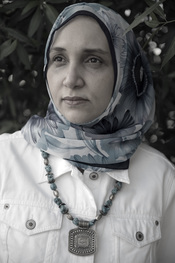The books bend sinister by Vladimir Nabokov and Minaret by Leila Aboulela both
deal with the issue of Cultural displacement and loss. I would like to compare the
difference in their situations how they have been or why they feel displaced and how
They dealed with the great losses in their family.
In Minaret Najwa (the books main character) is made to leave her home country
(Sudan) because her father (a prominent politician) has been accused of fraud and
corruption. Her father is put on trial and executed and Najwa is forced to come to
London with her Mother and her brother. She feels secluded from society in London
and misses her old way of life, where she had many servants to do everything for her
friends and s boyfriend. Najwa seems to be going through a very difficult stage in her
life but things take a turn for the worse when her brother kills another person (her
brother Omar is a drug addict and has been for quite some time) and to top things off
her Mother dies.
The effect of this on Najwa is extremely large she begins to start
searching for her identity and her purpose in life and in this process finds her faith -
Islam she was always part of Islam yet she only seriously got into it in these troubled
times. She uses Islam to cover up her troubles and her depression and tries to help her
brother yet he will not believe that Allah (Islam's god) can help him where he is. She
is saddened by this and goes on to pray for him every day.
--
In Nabokov's Bend Sinister the main character - Krug finds himself in a state which
has been taken over by a tyrannical Government - "the average man party" and the
leader is an old school colleague who he used to bully. In this almost comical State
Krug a professor of Philosophy is the only one who stands up to this regime.
Some people who read this book will think that Krug has not been excluded from
society but he has along with many other characters in the book. The main pointer
towards this is that Krug does not agree with what Paduk is doing and therefore is
automatically excluded. He sees past the façde and witnesses how all his friends start
getting arrested and inevitably himself.
He is offered a "deal" in which he would endorse what Paduk is trying to achieve yet
when the deal turns sour due to an administrational error Krug falls into a world of
complete madness. This is caused by his son being killed (instead of being brought to
the best stately home he is mixed up with a different boy and is put into the institute
for mad/deranged institute and has an "accident" This madness is how Krug deals
with his sense of no longer belonging to society as well as having lost the one thing
worth living for - his son.
In comparison these books couldn't be more different. On the one side you have
Najwa in Minaret living in Sudan with Islamic law, which is not obeyed to by the rich
and on the other we have Krug who lives in a communistic regime in an unknown
European Country. Striking similarities are that both characters are sent into denial or
madness by a huge loss. In Minaret Najwa looses her mother father and her brother
and in Bend Sinister Krug looses his wife and his son the effect on both characters is
extremely different as I mentioned Najwa searches for her identity or more a purpose
to her life. Instead of finding his religion Krug sees himself go into complete madness
when he finds out about his son yet how he dealed with the death of his wife is more
interesting. He seems to intermittently delve into a parallel world represented by a
puddle. This puddle appears at different stages in the book and always this second -
parallel world appears and Krug sees a different world. It is not an ideal world nor is it
a world of hell. It is a world to where Krug can retreat to. Krug also has very high
moral standards if something is wrong it is wrong and must be corrected before being
signed no matter how small the error with Najwa it seems that she does not mind the
small errors in life, the ones with no fundamental implications. In fact it is safe to say
she does not care about much at all. And the few things she does care about are
people. Also she seems extremely attached for the family she works for even if I
recall correctly saying that she would rather be a slave in that family than have no part
in it at all.





